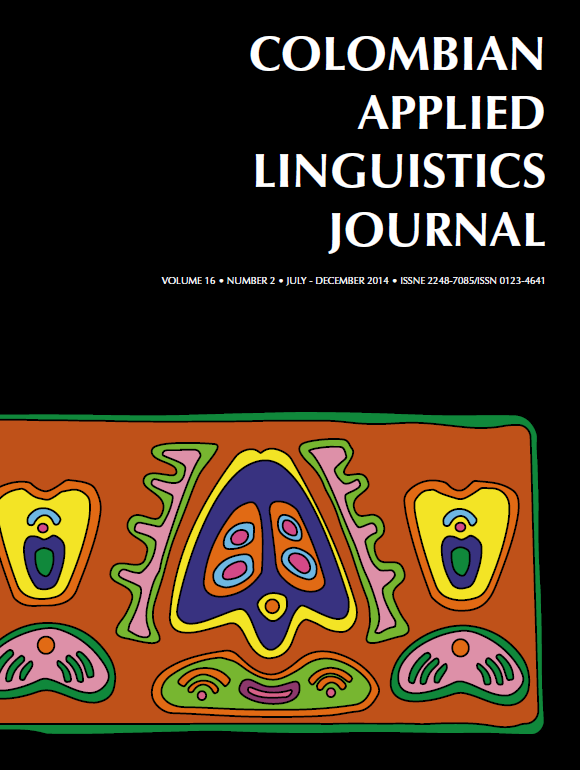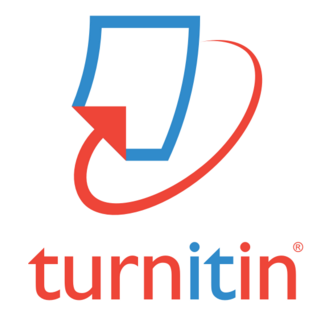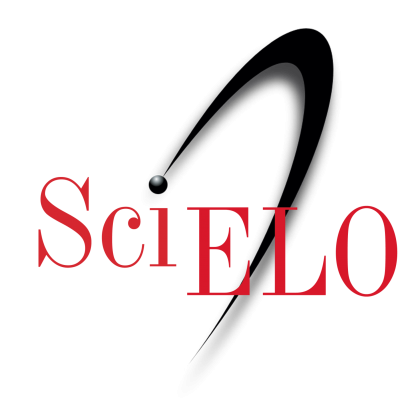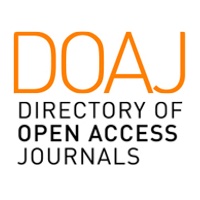DOI:
https://doi.org/10.14483/udistrital.jour.calj.2014.2.a05Published:
2014-09-22Issue:
Vol 16, No 2 (2014) July-DecemberSection:
Research ArticlesEFL student teachers’ learning in a peer-tutoring research study group
El aprendizaje de futuros profesores de inglés como lengua extranjera en un grupo de estudio e investigación enfocado a la tutoría entre pares
Keywords:
grupo de estudio, grupo de investigación, preparación de estudiantes, profesores de inglés como lengua extranjera, tutoría entre pares (es).Keywords:
study group, research group, EFL student teachers’ preparation, peer-tutoring, prospective teachers (en).Abstract (en)
In order to become peer-tutors in a BA program in Modern Languages, a group of English as a Foreign Language (EFL) student teachers attended a study and research group in a university. Throughout their participation, prospective teachers collaborated and reflected by means of task completion and dialogue to learn the theory and practice of tutoring and research. Additionally, participants provided survey, journal, and interview data to contribute to the exploration of how their group membership shaped them academically and personally. Results suggested that student teachers increased their knowledge of English due to their use of real-life group dynamics, among others. Furthermore, they updated and expanded their competencies to monitor pedagogical situations, design strategies, and solve problems.
Abstract (es)
Con el fin de convertirse en tutores de sus compañeros en un programa de Lenguas Modernas, un grupo de estudiantes profesores de inglés como lengua extrajera asistió a un grupo de estudio e investigación en una universidad. Los futuros profesores colaboraron y reflexionaron por medio de tareas y diálogo para aprender la teoría y práctica respecto a tutorías e investigación. Igualmente fueron encuestados y entrevistados para explorar cómo su pertenencia al grupo los influenciaba académica y personalmente. Nuestro análisis sugiere que los estudiantes incrementaron su conocimiento del inglés al utilizar estrategias y ser expuestos a la dinámica del grupo basada en la vida real. Además, actualizaron y expandieron sus competencias para monitorear situaciones pedagógicas, diseñaron estrategias y resolvieron problemas en su práctica.
References
Álvarez, G. & Sánchez, C. (2005). Teachers in a public school engage in a study group. Profile, 6, 119-132.
Arbaugh, F. (2003). Study groups: Professional growth through collaboration. The Mathematics Teacher, 96 ( 3),188-1992.
network shape student-seachers’ preparation? Paper presented in Asocopi Congress, Tunja, Colombia, 2009.
Carr, W. & Kemmis, S. (1986) Becoming critical: Education, knowledge and action research. Basingstoke: Falmer Press.
Clair, N. (1998). Teacher study groups: Persistent questions in a promising approach. TESOL Quarterly, 32, ( 3), 465-492.
De Tezanos, A. (1998). Una etnografía de la etnografía. Bogotá: Antropos.
Dewey, J. (1933). How we think. Chicago: Henry Regnery
Elliot, J. (1990). La investigación acción en educación. Madrid: Ediciones Morata.
Faustino, C. & Cárdenas, R. (2008). Impacto del componente de investigación en la formación de licenciados en lenguas extranjeras. Lenguaje, 36(2),407-446.
Hubbard, R. & Power, B. (1993). The art of classroom inquiry. A handbook for teacher-researchers. New Hampshire: Heinemann.
Janesick, V. (1994). The dance of qualitative research design. In N. Denzin, and Y. Lincoln (Eds.). Handbook of qualitative research (pp.209-219). California:Sage Publications, Inc.
Lee, H. (2005). Understanding and assessing pre-service teachers’ reflective thinking. Teaching and Teacher Education, 21, 699–715.
Mc Nulty, M. & Usma, J. (2005). Evaluating research skills development in a Colombian undergraduate foreign language teaching Program. Ikala, 10(16),95-125.
Musanti, S. & Pence, L. (2010). Collaboration and teacher development: Unpacking resistance, constructing Knowledge, and navigating identities. Teacher Education Quarterly, 37(1), 73-90.
Paredes, J., Sawyer, K.,Watson, S. & Myers,V. (2007). Teacher teams and distributed leadership: a study of group discourse and collaboration. Educational Administration Quarterly, 43,( 1), 67-100.
Price, J. (2001). Action research, pedagogy and change: The transformative potential of action research in pre-service teacher education. Journal of Curricular Studies, 33(1), 43-74.
Patnode, L. (2009). Educator study groups: A professional development tool to enhance inclusion. Intervention, 45(1), 24-30.
Richards, J. & Lockhart, (1994). Reflective teaching in second language classrooms. Cambridge: CUP.
Russell, T. (2000). Introducing pre-service teachers to research. Paper prepared for Session 18.16. at the American Education Research Association. Retrieved from http://educ.queensu.ca/~ar/aera2000/russell.pdf.
Sanacore, J.(1993). Continuing to grow as language arts educators: focusing on the importance of study groups. Washington: ERIC Clearinghouse.
Schecter,S. & Ramírez,R. (1992). A teacher researcher group in action. In D. Nunan (Edit.). Collaborative language Learning and Teaching (pp.192-207). Cambridge: C U P.
Sierra, A. (2007). Developing knowledge, skills and attitudes through study group. Ikala, 12 (18), 279 – 305.
Smith, R. & Coldron, J. (2000). How does research affect pre-service students' perceptions of their practice? Retrieved from http://www.eric.ed.gov/ERICWebPortal/recordDetail?accno=ED446030.
Viáfara, J. (2008). Pedagogical research in the practicum at Universidad Nacional: EFL pre-service teachers’ conceptions and experiences. Revista Electrónica Matices, 2. Retrieved from http://www.revistas.unal.edu.co/index.php/male.
Wallace, M. (1991). Training foreign language teachers: a reflective approach.Cambridge: CUP.
Zeichner, K. (1983). Alternative paradigms of teacher education. Journal of teacher education, 34(3), 3-9.
Zuluaga,C. Lopez,M. & Quintero,J. (2009). Integrating the coffee culture with the teaching of english. Profile, 11(2), 2009,27-42.
How to Cite
APA
ACM
ACS
ABNT
Chicago
Harvard
IEEE
MLA
Turabian
Vancouver
Download Citation
Metrics
License
This work is licensed under a Creative Commons Attribution-NonCommercial-NoDerivatives 4.0 International License.
Attribution — You must give appropriate credit, provide a link to the license, and indicate if changes were made. You may do so in any reasonable manner, but not in any way that suggests the licensor endorses you or your use.
NonCommercial — You may not use the material for commercial purposes.
NoDerivatives — If you remix, transform, or build upon the material, you may not distribute the modified material.
The journal allow the author(s) to hold the copyright without restrictions. Also, The Colombian Apllied Linguistics Journal will allow the author(s) to retain publishing rights without restrictions.














.JPG)










